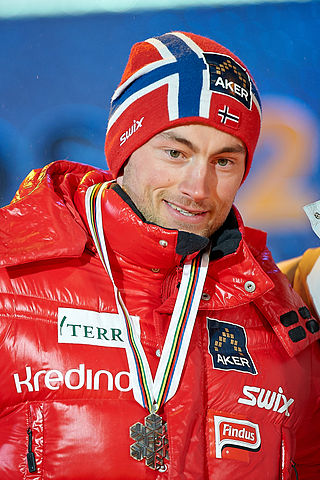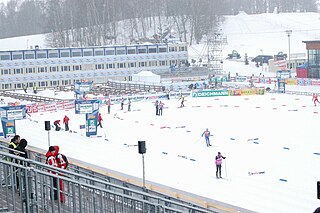
Manuela Di Centa is an Italian former cross-country skier and Olympic athlete. She is the sister of former cross-country skier Giorgio Di Centa and cousin of former track and field athlete Venanzio Ortis.
The Gundersen method is a method in the Nordic combined developed by Gunder Gundersen, a Nordic combined athlete from Norway, that was first used in the 1980s. In it, the ski jumping portion comes first, and points in the ski jump determine when individuals start the cross-country skiing portion, which is a pursuit race, so that whoever crosses the finish line first wins the competition. The system is now also used in the modern pentathlon in which the start times of the final event are staggered so that the first to cross the finish line is the winner of the entire event. World Athletics announced on 7 December 2018 that the 2020 World Under-20 Athletics Championship will adopt the Gundersen method for the decathlon and heptathlon for the final event. A similar system is used in professional golf's Tour Championship since 2019.

Petter Northug Jr. is a Norwegian former cross-country skier and double Olympic champion. He won a total of 13 World Championship and two Winter Olympic gold medals with 20 medals overall, and 18 individual FIS Cross-Country World Cup wins with 13 podium places. He is also the record holder for most stage wins (13) in Tour de Ski. By winning his ninth gold medal in the Nordic World Ski Championships in 4 × 10 km relay in Val di Fiemme 2013, he leveled the achievement of Bjørn Dæhlie who had been the most successful World Champion male skier up to that point. He is considered by many as the greatest cross-country skier of all time.

Per-Erik Hedlund was a Swedish cross-country skier. He competed in the 18 and 50 km events at the 1924 and 1928 Olympics and won the gold medal over 50 km in 1928, more than 13 minutes ahead of fellow Swede Gustaf Jonsson. While competing, he wore a show-white outfit, which was later considered as lucky, and was worn by Swedish Nordic skiers at every Winter Olympics for the next 48 years.

Sami Jauhojärvi is a Finnish former cross-country skier who competed between 2000 and 2017. At the 2014 Winter Olympics, he won men's team sprint with Iivo Niskanen. Germany launched a protest over the result due to a final-leg collision between Jauhojärvi and Tim Tscharnke, but it was rejected by the jury. Jauhojärvi's Finland finished fifth in the 4 x 10 km relay in Vancouver in 2010.

Dario Cologna is a Swiss retired cross-country skier. He has four overall World Cup victories, four Olympic gold medals, one World Championships gold medal and four Tour de Ski victories in his career.

At the FIS Nordic World Ski Championships 2009 in Liberec, Czech Republic, twelve cross-country skiing events were held with six for men and six for women. The format of the program was unchanged since the 2005 World Championships in Oberstdorf, Germany. For the men's events, Norway won five of the six events and a total of six medals with Petter Northug winning golds in the pursuit, 50 km and relay events. Ola Vigen Hattestad won two golds in the sprint events. The only event the Norwegians did not win was in the 15 km event, won by Estonia's Andrus Veerpalu, who became the oldest world champion ever.
The men's 15 kilometre freestyle cross-country skiing competition at the 2010 Winter Olympics in Vancouver, Canada, was held on 15 February at Whistler Olympic Park in Whistler, British Columbia, at 12:30 PST.
The men's 15 kilometre + 15 kilometre double Pursuit cross-country skiing competition at the 2010 Winter Olympics in Vancouver, Canada, was held on 20 February at Whistler Olympic Park in Whistler, British Columbia, at 13:30 PST.
The men's 4 × 10 kilometre relay cross-country skiing competition at the 2010 Winter Olympics in Vancouver, Canada, was held on 24 February at Whistler Olympic Park at 11:15 PST.

The women's 30 kilometre classical cross-country skiing competition at the 2010 Winter Olympics in Vancouver, Canada was held on 27 February at Whistler Olympic Park in Whistler, British Columbia at 11:45 PST.
The men's individual normal hill/10 km Nordic combined competition for the 2010 Winter Olympics in Vancouver, Canada, was held at Whistler Olympic Park in Whistler, British Columbia, on 14 February.
The men's team large hill/4 x 5 km Nordic combined competition for the 2010 Winter Olympics in Vancouver, Canada was held at Whistler Olympic Park in Whistler, British Columbia on 23 February. The Austrian team of Michael Gruber, Christoph Bieler, Felix Gottwald, and Mario Stecher were the defending Olympic champions. Gruber retired after the 2007-08 season. Gottwald originally retired after the 2006-07 World Cup season, but came out of retirement in May 2009 to compete for the 2009-10 World Cup season including the 2010 Games. The defending world champions were the Japanese team of Yūsuke Minato, Taihei Kato, Akito Watabe, and Norihito Kobayashi. The last World Cup event prior to the 2010 Games in this format took place on 12 December 2009 in Harrachov, Czech Republic, but that event was cancelled on 4 December 2009 to warm weather and lack of snow. A team normal hill event took place prior to the 2010 Winter Games in Schonach, Germany on 24 January 2010 and was won by the German team of Georg Hettich, Eric Frenzel, Björn Kircheisen, and Tino Edelmann.

Alexey Yurevich Poltoranin is a Kazakh cross-country skier who has competed at the international senior level since 2004. He has three World Cup wins, one in 2010 and two in 2013. In the 2013 World Championship in Val di Fiemme he won two bronze medals. Most of his best results are in the classic technique.
For the 1928 Winter Olympics in St. Moritz, Switzerland, a total of five sports venues were used. The main stadium hosted the figure skating, ice hockey, and speed skating events. Skeleton was first held at the Cresta Run. Bobsleigh was held at the bob run. St. Moritz itself served as cross-country skiing venue and the cross-country part of the Nordic combined event. Weather gave two events run at these games problems, creating the largest margin of victory in Olympic history for one and the cancellation of the other.
For the 1932 Winter Olympics in Lake Placid, New York, United States, a total of five sports venues were used. This was unchanged from the previous games in St. Moritz. For the first time in the history of the Winter Olympics, an indoor venue was used for the figure skating and six of the twelve ice hockey events at the Olympic Arena. The first bobsleigh venue outside Europe was constructed for use. Four different 18 km and five different 50 km venues were submitted for approval prior to the Olympics. After the 1932 games, three of these venues served as host for their respective championships that were held outside Europe for the first time.
For the 1984 Winter Olympics in Sarajevo, Yugoslavia, a total of nine sports venues were used. The idea for the Games came around from a 1968 Organisation for Economic Co-operation and Development study on promoting winter tourism in Yugoslavia. After Sarajevo was awarded the 1984 Games in 1978, venue construction and renovation took place between 1979 and 1983. Weather postponed the men's downhill alpine skiing event three times before it was finally run. The men's cross-country skiing 30 km event was run during a blizzard. After the games, all but one of the venues were damaged during the Bosnian War and the siege of Sarajevo. After the war, Zetra Ice Hall was rebuilt and is in use as of 2010.
For the 1992 Winter Olympics in Albertville, France, a total of thirteen sports venues were used. Val-d'Isère has been part of the Alpine Skiing World Cup since the late 1960s while Tignes served as host of the first Freestyle World Ski Championships in 1986. Most of the venues used were constructed between 1987 and mid 1990 with the test events taking place in late 1990 and early 1991. It was the last Winter Olympics with an outdoor speed skating rink which led to weather issues for three of the ten events. Three cross-country skiing events were run in snowstorms while the men's 20 km biathlon was found to be 0.563 km (0.350 mi) too short. The downhill events in alpine skiing were criticized for being too steep. Freestyle skiing made its official debut at these games with the men's winner being stormed after his win while the women's winner won her event in a snow storm. La Plagne hosted the skeleton World Championships in 1993 while Val-d'Isère hosted the Alpine World Ski Championships in 2009. Some of the venues will be used again during the 2030 Winter Olympics, when the main host city will be Nice.

For the 1998 Winter Olympics in Nagano, Japan, a total of fifteen sports venues were used. Nagano had attempted twice to host the Winter Olympics, losing out to Sapporo, host of the 1972 Winter Olympics. The third time, in 1991, Nagano edged out Salt Lake City to host the 1998 Games. The biathlon venue was adjusted in accordance with the Washington Convention over endangered species. The biggest venue controversy was at Happo'one resort on the length of the men's downhill and the battle that ensued to the point where skiing officials threatened to pull the event entirely before a compromise was reached three months before the Olympics. M-Wave has hosted three World Speed Skating Championships since the Olympics, while the Spiral has hosted a couple of world championships in bobsleigh, luge and skeleton.

The Men's 50 km freestyle mass start was the final event of the FIS Nordic World Ski Championships 2011. It was held at 6 March 2011 at 13:00 CET. Norway's Petter Northug is both the defending world and Olympic champion.











